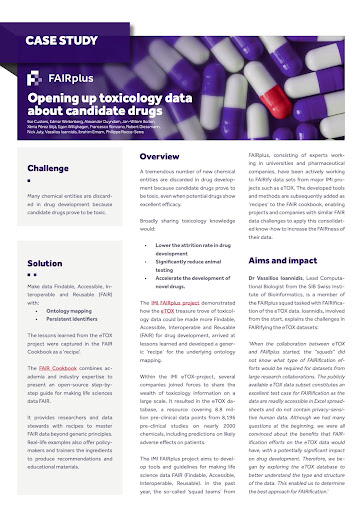eTOX case study: unlocking toxicology data for drug discovery
FAIRplus partners have finished working on making the eTOX data more Findable, Accessible, Interoperable and Reusable (FAIR). They have captured the lessons learned and hurdles found in a case study and the FAIR Cookbook .
In the eTOX IMI project, several companies joined forces to create a large scale toxicology database, covering 8.8 million pre-clinical data points on nearly 2,000 chemicals from 8,196 studies that included predictions on health effects.

Such an effort can significantly impact drug development since many new chemicals are discarded for their toxicity despite showing excellent efficacy.
However, data must be FAIR to exploit its full potential; eTOX data scored a FAIRness level of 25% based on concrete indicators.
After efforts from the FAIRplus project, the eTOX data FAIRness level rose to 50%, increasing the chances of sharing and reusing this treasure trove of toxicology data. Broadly sharing toxicology knowledge could:
- Lower the attrition rate in drug development
- Significantly reduce animal testing
- Accelerate the development of novel drugs
This case study analyses how the project achieved a 25% increase in FAIRness level, the hurdles faced, and the solutions applied. It focuses on two main solutions:
- Chemical identifiers. Convert files to commonly accepted standards by extracting identifiers [fcb:FCB007].
- Ontology mapping. Control terminology in free-text phrases to avoid subjective interpretations [fcb:FCB042].
The original eTOX FAIRification recipes have been provided to eTRANSAFE for further reuse and are also available in the FAIRplus cookbook. The FAIRification of the eTOX-data and the FAIRcookbook recipes will help life sciences researchers in academic and private settings accelerate research by making data more connected.
Read/download/share the eTOX case study, openly available on Zenodo.
For more information on the eTOX case, visit the FAIR Cookbook applied example
